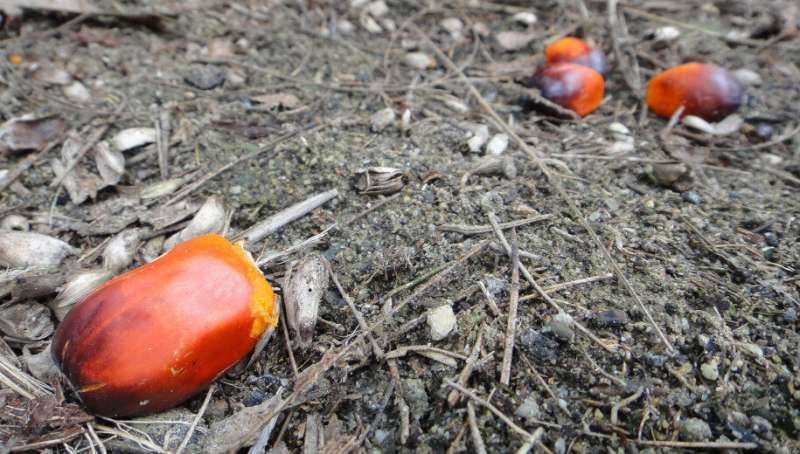India's oil palm goals raise fears of deforestation

India's newly announced plan to move from being the world's biggest importer of palm oil to that of major producer of the crop may be at the cost of large-scale deforestation of ecologically sensitive areas.
An official note posted recently said the union cabinet headed by Prime Minister Narendra Modi had approved the launch of a National Mission on Palm Oil that would have a "special focus on the north-east region and the Andaman and Nicobar Islands."
"Due to the heavy dependence on imports for edible oils, it is important to make efforts for increasing the domestic production of edible oils in which increasing area and productivity of oil palm plays an important part," the note said.
According to the Solvent Extractors Association of India, the country spends an average of US$10 billion on importing palm oil—the cheapest source of fat that goes into the processed food and cosmetic industries.
India aspires to bring one million hectares of land under oil palm cultivation by 2025, scaling up from its current cultivation area of around 0.37 million hectares. The Indian Institute of Oil Palm Research has assessed that the country has 2.8 million hectares of land that could potentially be used for oil palm cultivation. The government has allocated US$1.5 billion to help achieve this target. By 2025–26, India's crude oil production is expected to reach 1.12 million tons, rising to 2.8 million tons by 2029–30.
"The decision of the government is nothing new but a continuation of the previous government policies to reduce dependency from import of edible oil," says Siraj Hussain, India's former secretary of Agriculture and Farmers' Welfare.
Hussain explains to SciDev.Net that when he was the secretary, he too pushed oil palm plantation as it "yields about five times more oil than other edible oils per hectare of cultivated area."
However, India's drive to expand palm oil production has not been welcomed by local politicians and experts who warn that it could lead to large-scale deforestation, disturbances to sensitive ecosystems and trigger land conflicts in tribal areas.
Agatha Sangma, a member of parliament from Meghalaya state in the north-east, tells SciDev.Net that she has written to the prime minister opposing the move on the grounds that it would ruin the country's environment, citing the experiences of Indonesia and Malaysia where around 3.5 million hectares of forest have been converted into oil palm plantations.
"Our north-east region has rich biodiversity and it will get ruined soon if the palm oil mission is implemented," she says adding that the plan could also lead to land conflict with ethnic peoples.
According to the World Wildlife Fund, a leading conservation organization, oil palm plantations are spreading across Asia, Africa and Latin America at the "expense of tropical forests—which form critical habitats for many endangered species and a lifeline for some human communities."
"Besides causing large scale deforestation of rainforest of the region, it would invite conflict between private companies and ethnic tribes as private companies are going to indirectly control their land," says T R Shankar Raman of Nature Conservation Foundation, a South India based non-profit organization which has carried out a detailed study on the negative effects of oil palm plantations in Mizoram, a north-eastern state.
A review paper published in Advances in Agronomy says that the conversion of forest land into oil palm plantations reduces water infiltration and dry season water flows, and increase soil erosion, sedimentation and surface runoff. Another study shows that bird populations declined when natural forests were replaced by oil palm plantations in Mizoram.
"It is time to promote traditional oil seed varieties like coconut rather than industrial-scale production of oil with exotic species," says Kartini Samon, an Indonesia-based activist who works with GRAIN, an international non-profit that supports small-scale farmers and community-based biodiversity conservation.
In April, Sri Lanka banned imports of palm oil and ordered the phased uprooting of palm oil plantations in favor of crops that are regarded as more environment-friendly such as coconut, tea and rubber.
Provided by SciDev.Net

















